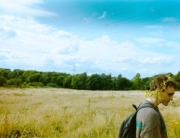The directorial debut of Alejandro Loayza Grisi, who has a background in still photography, is something of a postmodern Western, taking the conventions of the genre in a different direction. Like a classic Western, it features beautiful shots of the desert, with its vast blue sky and endless, unforgiving landscape. However, this is set in the Bolivian highlands, not the American West, and the heroes are an elderly couple, Virginio and Sisa.
The film opens with a long shot of Virginio (José Calcina) limping along, the vast, grand horizon behind him, in an introduction fit for a heroic cowboy, but he is an old man who sometimes has a hard time breathing. Still, he gets up every day and tends to his small herd of llamas. His wife, Sisa (Luisa Quispe), walks long distances to get water. It’s a struggle to have enough water to survive. This life would be hard at any age—the nearby village is virtually deserted; most of the residents have left for the city. Virginio and Sisa are among the few holdouts, carrying on a family tradition of farming.
The couple live their steady modest lives in a small, thatched roof, mud brick dwelling, which has no electricity. After decades of marriage, they still have a playful dynamic. When they first wake up one morning, Virginio is looking at Sisa, and she says, “Stop staring at me and get to work.” He gives her a coy look, like he can’t believe how feisty she still is, or how grateful he is for her ever-youthful spirit, which is what keeps him going. They have more on-screen chemistry than more glamorous stars a fraction of their age. Their shy smiles to each other, and the way they hold hands, communicates more intimacy than anything you’ll see from George Clooney or Julia Roberts.
It’s a film of contrasts—between the modest home life of the couple and the vast, vibrant, radiant landscape—and this should ideally be seen on the big screen. The peaceful and quiet tone contrasts with the unmistakable onrushing of death and a fading way of life—you can hear it in every labored breath Virginio takes and with each pained step he takes while tending to his herd. There’s also constant motion, in the llamas moving around and making noises, Virginio shuffling along, and Sisa trekking miles for water. The sound design is rich, bringing the sound of empty water pumps and creaking swinging doors, and the windswept Andean plateau to the forefront. A quiet film filled with sound, a still film filled with motion, a cozy domestic film set amid the mercilessness of the desert—these contrasts exist in perfect harmony.
Like any good Western, there’s a villain, but the villain Virginio faces is death itself. He faces it with every step, and every breath, but he doesn’t let it scare him. He shows courage, taking on the ultimate enemy with no fear. His grandson, Clever (Santos Choque), tries to get Virginio to accept medical help so he can at least extend his life a bit, or ease his pain. But Clever comes to realize that an old cowboy like Virginio plays by his own rules. Utama, (Our Home in Quechua) seems modest on the surface, but it explores the deep themes of the Western genre in a fearless, raw, and authentic way.







Leave A Comment